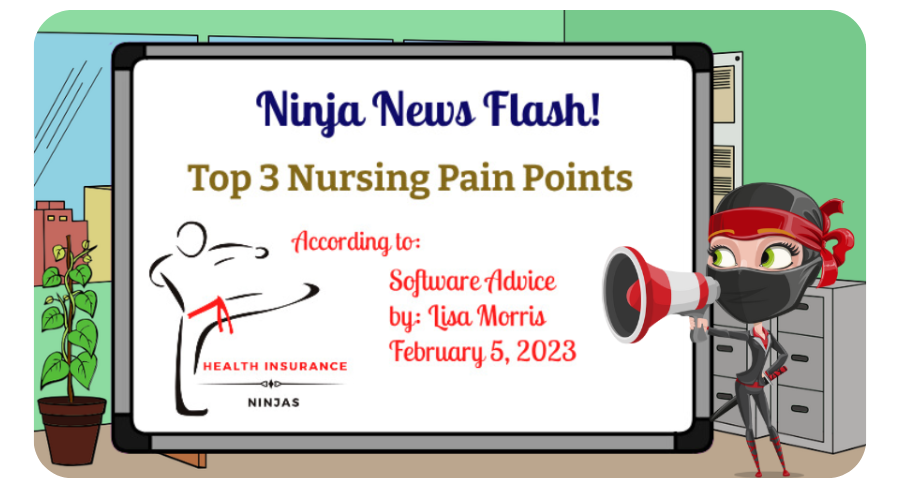
Surveyed Nurses Speak Out Uncovering Burnout in the Industry
- August 24, 2023
- Ninja News Flash
Surveyed nurses have revealed the alarming rate of burnout among healthcare professionals and its impact on the diminishing workforce. The findings shed light on the immense pressure and stress nurses face daily, leading to exhaustion and ultimately affecting their physical and mental health. Nurses cited long working hours, inadequate staffing levels, and increasing patient needs as major contributors to their burnout.
With burnout rates on the rise, more and more nurses are leaving the profession, exacerbating the existing shortage of healthcare workers. This survey highlights the urgent need for hospitals and healthcare organizations to address burnout and provide support systems that prioritize the well-being of nurses, ultimately ensuring a sustainable and resilient workforce.
According to:

Software Advice Surveyed Nurses - Indentified 3 Pain Points
Based on Software Advice’s survey results, it is evident that surveyed nurses have a deep sense of purpose and commitment to their profession. A remarkable 87% of the nurses polled expressed that they were driven to enter the nursing field due to their desire to assist others.
Additionally, an astonishing 99% of nurses firmly believe that they create a positive impact in the lives of their patients. Furthermore, an impressive 67% of nurses stated that they would highly recommend a career in nursing to individuals currently pursuing their education.
These findings highlight the level of satisfaction and fulfillment experienced by nurses in their chosen path. It underscores the noble calling that nursing represents and the significant influence it has on both caregivers and patients alike.
Per Surveyed Nurses Burnout Leading to Leaving Healthcare
It is a concerning statistic that 68% of surveyed nurses have recently contemplated leaving their positions. Additionally, over half of nurses believe that the quality of care they can deliver has declined within the last three years. Inquiring about the specific hardships that are propelling them towards resignation, it was found that the top three concerns revolve around an imbalance between workload and available nursing staff. This alarming data highlights the urgent need for attention and action to mitigate these challenges in healthcare settings.
Pain Point Fix #1: Pay Them More!
This might seem like an obvious suggestion, but it holds immense value. Providing nurses with a higher salary can greatly alleviate the challenges they face in their profession and personal lives.
Unfortunately, 83% of surveyed nurses believe that their salaries have failed to keep up with inflation. Currently, the annual inflation rate in the U.S. stands at approximately 6.5%.
To illustrate, our research indicates that most nurses earn a minimum of $75,000 per year (although a majority surpass this amount). Considering a raise commensurate with the current inflation rate, these nurses would require an increase of around $4,875.
If increasing pay is not feasible for an organization at the moment, alternative methods of financial support for their nurses should be explored. One option is to assist with the costs associated with their mandatory continuing education.
A substantial portion of surveyed nurses revealed that they bear full responsibility for covering the expenses of their ongoing educational credits. Employers could consider contributing to this aspect as it offers several advantages for your practice.
Pain Point Fix #2: Hire More Support!
The workload of nurses is currently a major concern, and it is crucial to address these issues promptly. Hiring more nurses is the most effective solution to alleviate this problem and distribute the workload more fairly.
Furthermore, it is important to recognize the broader implications of staff shortages on an entire organization. Patient feedback plays a significant role in performance evaluations for 53% of nurses. However, when evaluating the value of this metric, it is essential to consider the impact of reduced staffing.
If your nursing team is stretched thin, it may reflect in patient feedback. Relying on this feedback to justify mediocre or poor performance ratings can lead to a loss of talented professionals.
Instead, prioritize attracting new talent to support your existing staff by enhancing your employee value proposition.
Pain Point Fix #3: Lean Into Software Solutions!
The final recommendation from Software Advice is related to the IT aspect rather than HR. One of the main concerns raised by nurses currently is the significant amount of time they spend on administrative tasks. This issue becomes even more understandable when considering the additional workload they face, as they need to see an increasing number of patients with fewer nurses available.
For 60% of surveyed nurses, having increased paid time off would make a substantial difference in addressing this issue.
However, due to the shortage of nurses, it can be challenging to grant your team extra time off when their presence is crucial for the functioning of your practice. As a compromise solution, implementing telemedicine can allow your nurses to work some shifts from the comfort of their own homes.
This approach is already being practiced by approximately one-third (34%) of nurses.
It has been established through various research that 91% of patients are more likely to choose a healthcare provider who offers telemedicine services compared to those who do not. This clearly indicates that patients desire this technology.
The advantages of telemedicine extend beyond just patient satisfaction. Not only do patients benefit from faster and easier access to medical care, but providers also gain increased flexibility in their scheduling.
Surveyed Nurses Final Thoughts
In conclusion, nurse burnout is a critical issue that needs to be addressed to improve workplace conditions and the overall well-being of nurses. Surveyed nurses have identified their top three pain points, which must be resolved to alleviate burnout. By addressing these issues, such as improving nurse-patient ratios, providing adequate support and resources, and prioritizing self-care, healthcare organizations can create a healthier work environment and help nurses thrive in their professions. It is crucial for the healthcare industry to recognize the urgency of this problem and take action to resolve these pain points.
The Ninja News Flash⚡
Subscribe today for bi-weekly free resources, alerts, freebies, and more specifically for travel nurses, PRNs, and O/O Truckers valuable insights regarding YOUR Industry AND healthcare, insurance, and work/life balance. Like & Share please.
- Published On: February 5, 2023
- Publication Site: Software Advice
- Author Name: Lisa Morris
- Credited Full Article Here
Stay in the Ninja News Loop!
Subscribe to our monthly newsletter & receive all our free resources once a month in your Inbox.

Check Us Out!

The Truth About Per Diem Vs Part Time: What You Need To Know
Per Diem or Part Time nursing, what’s right for you? The world of nursing today presents an excellent variety of choices for work settings and

The Best Paying Nursing Jobs of 2024: Maximize Your Earnings
Nursing jobs can be very rewarding careers, both personally and financially. The median annual salary for registered nurses (RNs) in the US is $81,220. However,

Student Loan Forgiveness for Nurses: What You Need to Know
Student Loan Forgiveness can be the answer to many nurses struggling with debt. There is hope for relief through student loan forgiveness programs specifically designed




